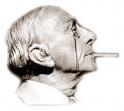Nixon vs. The Neoconservatives?

Some interesting, if oddly interpreted, background at HNN on Fritz Kraemer, the influential hardliner and intellectual mentor of Henry Kissinger and Al Haig, and Kraemer’s influence in American foreign policy:
Luke A. Nichter: Who Was Fritz Kraemer? And Why We Should Care.
Whether Vietnam, Iraq, or now Afghanistan, wars come and go, but the real battle is a philosophic one between two sects of conservatives. In The Forty Years War: The Rise and Fall of the Neocons from Nixon to Obama, authors Len Colodny and Tom Shachtman challenge readers to examine the role of a little-known Pentagon figure named Fritz G.A. Kraemer. Colodny  and Shachtman argue that Kraemer was the leading intellectual behind what became known as the neo-conservative movement, witnessed by the fact that Kraemer influenced so many high-ranking conservative figures over the course of six decades.….This meeting was probably the only one to have occurred during the Nixon presidency in which Nixon and Kissinger permitted a rigorous debate, in the Oval Office no less, over the merits of not just Vietnam policy, but Nixon foreign policy more generally. Kraemer knew the issues well enough that both Nixon and Kissinger were forced to defend themselves to someone who represented an increasingly disenchanted sect of conservatives. Kraemer believed, as other conservatives did, that the conduct of Nixon foreign policy had became tainted by short-term political considerations, and that politicians had acted as a restraining influence on military leaders who believed they were capable of achieving a military victory..
and Shachtman argue that Kraemer was the leading intellectual behind what became known as the neo-conservative movement, witnessed by the fact that Kraemer influenced so many high-ranking conservative figures over the course of six decades.….This meeting was probably the only one to have occurred during the Nixon presidency in which Nixon and Kissinger permitted a rigorous debate, in the Oval Office no less, over the merits of not just Vietnam policy, but Nixon foreign policy more generally. Kraemer knew the issues well enough that both Nixon and Kissinger were forced to defend themselves to someone who represented an increasingly disenchanted sect of conservatives. Kraemer believed, as other conservatives did, that the conduct of Nixon foreign policy had became tainted by short-term political considerations, and that politicians had acted as a restraining influence on military leaders who believed they were capable of achieving a military victory..
….At the heart of the dance was a fundamental philosophic difference between Kraemer’s ideologically purist, militarist, anti-diplomacy stance, and Nixon’s quintessential pragmatic stance. Kissinger and Haig were caught between these antipodal poles. Kraemer had “discovered” Kissinger in 1944 at Camp Claiborne, had superseded his goal of becoming an accountant and readied him intellectually for Harvard. As Kissinger would later acknowledge, “Kraemer shaped my reading and thinking, influenced my choice of college, awakened my interest in political philosophy and history, inspired both my undergraduate and graduate theses and became an integral and indispensable part of my life.” In the Pentagon in 1961, Kraemer had similarly discovered Haig, and recommended him for greater responsibilities in the office of Secretary of Defense Robert McNamara. At the moment of entering the White House in 1969, both Kissinger and Haig subscribed largely to Kraemer’s tenets.…..There’s much more to the story of this quartet, including Haig’s efforts to push Nixon up the plank toward resignation, and how those who detested Nixon’s foreign policies became the neocons in the Ford and Carter years, when they continued and magnified their efforts to undermine those presidents’ Nixonian foreign policies.
Page 1 of 2 | Next page